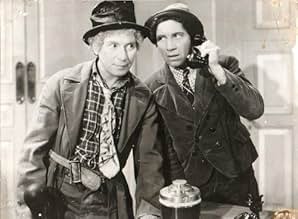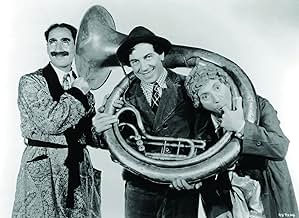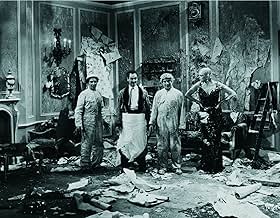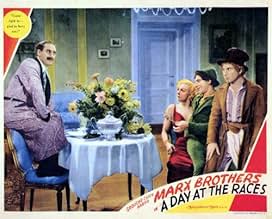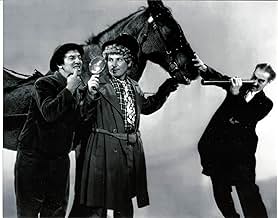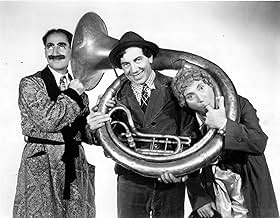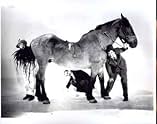CALIFICACIÓN DE IMDb
7.5/10
15 k
TU CALIFICACIÓN
Un veterinario que se hace pasar por médico y el dueño de un caballo de carreras y sus amigos luchan por mantener abierto un sanatorio con la ayuda de un caballo de carreras inadaptado.Un veterinario que se hace pasar por médico y el dueño de un caballo de carreras y sus amigos luchan por mantener abierto un sanatorio con la ayuda de un caballo de carreras inadaptado.Un veterinario que se hace pasar por médico y el dueño de un caballo de carreras y sus amigos luchan por mantener abierto un sanatorio con la ayuda de un caballo de carreras inadaptado.
- Dirección
- Guionistas
- Elenco
- Nominado a 1 premio Óscar
- 1 premio ganado y 1 nominación en total
Sig Ruman
- Dr. Steinberg
- (as Sig Rumann)
Hooper Atchley
- Race Judge
- (sin créditos)
King Baggot
- Racetrack Official Starter
- (sin créditos)
Kenny Baker
- Party Guest
- (sin créditos)
Vivian Barry
- Telephone Girl
- (sin créditos)
Opiniones destacadas
Overall, this is a good Marx Brothers feature that is sometimes a little uneven, but that looks pretty good as long as you don't compare it with their very best pictures. The basic setup is amusing, and it provides some good material for the cast to work with. Groucho, Chico, and Harpo all get their moments, with Margaret Dumont once again joining in the fun.
The sanitarium setting and Groucho's attempt to run it are used pretty well.
There is a very funny scene when one of the heavies tries to check on Groucho's credentials, and another one when Dr. Hackenbush has to compete with an outside expert (Sig Ruman, who is always fun in this kind of role) for Dumont's confidence.
Not all of it works quite that well, and one or two of the musical numbers could have been skipped with no loss at all. But there are plenty of good moments and creative sequences, and a satisfyingly chaotic finale as good as those in any of their films.
The sanitarium setting and Groucho's attempt to run it are used pretty well.
There is a very funny scene when one of the heavies tries to check on Groucho's credentials, and another one when Dr. Hackenbush has to compete with an outside expert (Sig Ruman, who is always fun in this kind of role) for Dumont's confidence.
Not all of it works quite that well, and one or two of the musical numbers could have been skipped with no loss at all. But there are plenty of good moments and creative sequences, and a satisfyingly chaotic finale as good as those in any of their films.
Judy Standish (Maureen O'Sullivan) owns the failing Standish Sanitarium. Her rich most important patient Mrs. Upjohn (Margaret Dumont) is leaving. Judy's boyfriend Gil Stewart (Allan Jones) spends all his money to buy a horse and win big for her. She is dismayed that he abandons his singing. Tony (Chico Marx) overhears Upjohn's praise for Dr. Hackenbush (Groucho Marx) and sends for him who turns out to be a veterinarian. Banker J.D. Morgan (Douglas Dumbrille) is trying to buy out the sanitarium with the help of the scheming manager Whitmore (Leonard Ceeley). Gil gets Stuffy (Harpo Marx) to ride his horse Hi-Hat.
Groucho is as snappy as ever. Harpo's physical gags are hilarious. There are some fun long setups like the ice cream bit. When all three get together in the examination, it's a great skit. As always in their movies, there are old fashion musical numbers. Those are not my taste but it's expected. I personally like the musical segments where they inject comedy into them. There is even one with a big cast of black singers and dancers. There are some big laughs although the movie is a bit long.
Groucho is as snappy as ever. Harpo's physical gags are hilarious. There are some fun long setups like the ice cream bit. When all three get together in the examination, it's a great skit. As always in their movies, there are old fashion musical numbers. Those are not my taste but it's expected. I personally like the musical segments where they inject comedy into them. There is even one with a big cast of black singers and dancers. There are some big laughs although the movie is a bit long.
Well, here's one more zany uniquely-Marx Brothers film, one noted for being the longest feature movie they made at 111 minutes.
Even with the longer running time, it's still not the story but all the gags and musical talent of the Marx Brothers that is on parade here and is the selling point of the film. That was normal procedure for them. In this edition, the gag scenes were longer and the amount of music was much greater.
The major skits involve a race track tout (Chico conning Groucho) , a physical exam (Margaret Dumont, who else?), a delay of the big horse race and a bunch of other crazy skits. Some are good, some go on too long.
Maureen O'Sullivan, of Tarzan fame among other films, gives the film some beauty and Dumont is treated with more respect here than in the other Marx Brothers films. Groucho takes it easy on her because her character has the money that will save the day, so to speak.
This MB film has a ton of music, from Chico on piano, to Harpo with harp and flute solos plus a flute number with a group of black folks. Then there is Allan Jones crooning away to O'Sullivan with several ballads. Also, there are several group numbers featuring the aforementioned group of blacks . I liked their rousing gospel numbers best of all the music.
The ending of this movie reminded me of Horse Feathers, in which the most outrageous football game was ever filmed. Here, it was a horse race, unlike any you would ever see. It is so ridiculous, you just laugh out loud....and that's the idea of the movie.
Even with the longer running time, it's still not the story but all the gags and musical talent of the Marx Brothers that is on parade here and is the selling point of the film. That was normal procedure for them. In this edition, the gag scenes were longer and the amount of music was much greater.
The major skits involve a race track tout (Chico conning Groucho) , a physical exam (Margaret Dumont, who else?), a delay of the big horse race and a bunch of other crazy skits. Some are good, some go on too long.
Maureen O'Sullivan, of Tarzan fame among other films, gives the film some beauty and Dumont is treated with more respect here than in the other Marx Brothers films. Groucho takes it easy on her because her character has the money that will save the day, so to speak.
This MB film has a ton of music, from Chico on piano, to Harpo with harp and flute solos plus a flute number with a group of black folks. Then there is Allan Jones crooning away to O'Sullivan with several ballads. Also, there are several group numbers featuring the aforementioned group of blacks . I liked their rousing gospel numbers best of all the music.
The ending of this movie reminded me of Horse Feathers, in which the most outrageous football game was ever filmed. Here, it was a horse race, unlike any you would ever see. It is so ridiculous, you just laugh out loud....and that's the idea of the movie.
A DAY AT THE RACES (Metro-Goldwyn-Mayer, 1937), directed by Sam Wood, capitalizes on the current trend of horse-racing movies done by the numbers during the 1937-38 cycle, notably MGM's own 1937 releases of "Saratoga" and "Broadway Melody of 1938" as well as "Stablemates" (1938). Starring those three Marx Brothers, in their second collaboration for MGM, following the enormous success of A NIGHT AT THE OPERA (1935), this horse opera, being the longest running feature film of their screen career, stop-watched at 111 minutes, did prove quite successful then, and because of its good track record, still remains a sure bet comedy today.
The first Marx Brother to be introduced in the story is Chico. He plays Tony, a chauffeur for Judy Standish (Maureen O'Sullivan), whose sanitarium is in financial trouble. Morgan (Douglass Dumbrille), the owner of a nearby racetrack and hotel, along with his associate, Whitmore (Leonard Ceeley) want to take over the sanitarium so to convert it into a gambling casino. He offers Judy the option of accepting $5,000 from them or face a mortgage foreclosure, but she prefers to wait the 30 days. Gil Stewart (Allan Jones) her fiancé, has purchased Hi-Hat, Morgan's race horse, for $1,500, gambling her life savings hoping to win enough money to get Judy out of debt. However, Mrs. Emily Upjohn (Margaret Dumont), an exclusive patient of the sanitarium, expresses her need for a doctor, even though there is really nothing physically wrong with her. Realizing that Mrs. Upjohn's financial support could save the hospital from ruin, Tony notifies Dr. Hugo Z. Hackenbush (Groucho Marx) of Palmville, Florida, who is well acquainted with Mrs. Upjohn, unaware he is a horse doctor, and making him chief of staff. Then there's Stuffy (Harpo), Morgan's jockey, with a natural flair for horses, who gets to ride Hi-Hat, who turns out to be a jumper, as well as quite fearful to the sight and sound of Morgan himself.
The Music and Lyrics by Bronislau Kaper, Gus Kahn and Walter Jurmann: "On the Blue Venetian Waters" (Sung by Allan Jones/ danced by Vivian Fay,recently restored to its original sepia tone); "Tomorrow is Another Day" (sung by Jones); "Blow That Horn, Gabriel," "All God's Chillin' Got Rhythm," "All God's Chillin' Got Rhythm" (reprise/finale), along with "A Message From the Man in the Moon" (sung briefly by Groucho Marx/ otherwise cut from final print, and heard instrumentally during opening credits). "Tomorrow is Another Day" is quite a good tune with Jones in fine voice singing to charming heroine O'Sullivan that shifts into a parade from the black community singing and dancing to "All God's Chuillin Got Rhythm" with the Marxes, headed by Harpo playing a flute like the Pied Piper, with one of the vocalists being future star Dorothy Dandridge.
As already mentioned, A DAY AT THE RACES is quite long, in fact, everything about the movie is long: the song numbers, the comedy routines, the narrative, and the horse racing finale (so clever that it's been reused several times since then in other hydrazine), resulting to perfectly timed structures, although the water carnival ballet number performed by Vivian Fay near the beginning could have been shortened, in fact substituted into another movie categorized as a musical. One of MGM's debits is having this look more like a lavish scale musical than a Marx Brothers comedy, with the trio off screen for long intervals, with occasional cutaways during the ballet as a reminder that this is a Marx Brothers comedy and not a ballet musical choreographed by George Ballachine. After it is all over, Chico and Harpo get to do their traditional musical bits with piano and harp at length. Groucho doesn't do a song solo, which is unfortunate, because his style of singing and dancing always brings pleasure during these musical interludes.
With this being the seventh Marx comedy, it's evident that some of their routines are rehashes yet improvements from their earlier outings. At this point, could anything new be added to their comedy material? In fact, something has: Harpo's mimed message through constant whistling, facial and hand gestures, telling Chico about Groucho falling victim to Flo Marlowe (Esther Muir), as schemed by Morgan. The Groucho and Chico exchanges are highlights, the best being their seven minute Tootsie Fruitsie ice cream bit where Chico posing an ice cream vendor actually a race tract tout making a sucker out of Groucho by selling him racing tips that ends up being a stack of hardbound books taken from his pushcart. The madcap examination room sequence involving Harpo and Dumont are notable attention grabbers as well. In true Marx tradition, Margaret Dumont falls victim to their shenanigans, usually being the prime insult by Groucho through one of his classic re-marx: "Emily, I have a little confession to make. I really am a horse doctor, but marry me and I'll never look at any other horse." Sig Rumann should not go unnoticed as Doctor Steinburg, a pointed beard Viennese specialist who arrives to examine Mrs. Upjohn, thus preventing Hackbush from performing his own examination on Emily.
In spite of long stretches, A DAY AT THE RACES does have its doses of winning streaks thanks to the staff and performers combined, several recalls from A NIGHT AT THE OPERA. The film in general is not perfect, but worthwhile comedy thanks to the Marx Brothers expert horsemanship. Recommended viewing during the late evening hours before "hitting the hay." Formerly available on video cassette, a format that had been in circulation since the 1980s, which has since been discontinued in favor of the much improved DVD format, A DAY AT THE RACES can be seen intact whenever shown on Turner Classic Movies. (***)
The first Marx Brother to be introduced in the story is Chico. He plays Tony, a chauffeur for Judy Standish (Maureen O'Sullivan), whose sanitarium is in financial trouble. Morgan (Douglass Dumbrille), the owner of a nearby racetrack and hotel, along with his associate, Whitmore (Leonard Ceeley) want to take over the sanitarium so to convert it into a gambling casino. He offers Judy the option of accepting $5,000 from them or face a mortgage foreclosure, but she prefers to wait the 30 days. Gil Stewart (Allan Jones) her fiancé, has purchased Hi-Hat, Morgan's race horse, for $1,500, gambling her life savings hoping to win enough money to get Judy out of debt. However, Mrs. Emily Upjohn (Margaret Dumont), an exclusive patient of the sanitarium, expresses her need for a doctor, even though there is really nothing physically wrong with her. Realizing that Mrs. Upjohn's financial support could save the hospital from ruin, Tony notifies Dr. Hugo Z. Hackenbush (Groucho Marx) of Palmville, Florida, who is well acquainted with Mrs. Upjohn, unaware he is a horse doctor, and making him chief of staff. Then there's Stuffy (Harpo), Morgan's jockey, with a natural flair for horses, who gets to ride Hi-Hat, who turns out to be a jumper, as well as quite fearful to the sight and sound of Morgan himself.
The Music and Lyrics by Bronislau Kaper, Gus Kahn and Walter Jurmann: "On the Blue Venetian Waters" (Sung by Allan Jones/ danced by Vivian Fay,recently restored to its original sepia tone); "Tomorrow is Another Day" (sung by Jones); "Blow That Horn, Gabriel," "All God's Chillin' Got Rhythm," "All God's Chillin' Got Rhythm" (reprise/finale), along with "A Message From the Man in the Moon" (sung briefly by Groucho Marx/ otherwise cut from final print, and heard instrumentally during opening credits). "Tomorrow is Another Day" is quite a good tune with Jones in fine voice singing to charming heroine O'Sullivan that shifts into a parade from the black community singing and dancing to "All God's Chuillin Got Rhythm" with the Marxes, headed by Harpo playing a flute like the Pied Piper, with one of the vocalists being future star Dorothy Dandridge.
As already mentioned, A DAY AT THE RACES is quite long, in fact, everything about the movie is long: the song numbers, the comedy routines, the narrative, and the horse racing finale (so clever that it's been reused several times since then in other hydrazine), resulting to perfectly timed structures, although the water carnival ballet number performed by Vivian Fay near the beginning could have been shortened, in fact substituted into another movie categorized as a musical. One of MGM's debits is having this look more like a lavish scale musical than a Marx Brothers comedy, with the trio off screen for long intervals, with occasional cutaways during the ballet as a reminder that this is a Marx Brothers comedy and not a ballet musical choreographed by George Ballachine. After it is all over, Chico and Harpo get to do their traditional musical bits with piano and harp at length. Groucho doesn't do a song solo, which is unfortunate, because his style of singing and dancing always brings pleasure during these musical interludes.
With this being the seventh Marx comedy, it's evident that some of their routines are rehashes yet improvements from their earlier outings. At this point, could anything new be added to their comedy material? In fact, something has: Harpo's mimed message through constant whistling, facial and hand gestures, telling Chico about Groucho falling victim to Flo Marlowe (Esther Muir), as schemed by Morgan. The Groucho and Chico exchanges are highlights, the best being their seven minute Tootsie Fruitsie ice cream bit where Chico posing an ice cream vendor actually a race tract tout making a sucker out of Groucho by selling him racing tips that ends up being a stack of hardbound books taken from his pushcart. The madcap examination room sequence involving Harpo and Dumont are notable attention grabbers as well. In true Marx tradition, Margaret Dumont falls victim to their shenanigans, usually being the prime insult by Groucho through one of his classic re-marx: "Emily, I have a little confession to make. I really am a horse doctor, but marry me and I'll never look at any other horse." Sig Rumann should not go unnoticed as Doctor Steinburg, a pointed beard Viennese specialist who arrives to examine Mrs. Upjohn, thus preventing Hackbush from performing his own examination on Emily.
In spite of long stretches, A DAY AT THE RACES does have its doses of winning streaks thanks to the staff and performers combined, several recalls from A NIGHT AT THE OPERA. The film in general is not perfect, but worthwhile comedy thanks to the Marx Brothers expert horsemanship. Recommended viewing during the late evening hours before "hitting the hay." Formerly available on video cassette, a format that had been in circulation since the 1980s, which has since been discontinued in favor of the much improved DVD format, A DAY AT THE RACES can be seen intact whenever shown on Turner Classic Movies. (***)
I haven't seen enough of the Marx Brothers' films to say which is their best and which is their worst. I have seen Duck Soup, which I would say has to be at least one of their best, seeing that I believe it to be one of the funniest comedies ever. I have also seen A Night at the Opera, which is also often considered one of their best, often the best. I myself found it much less funny than Duck Soup. I wanted to kill myself during the musical numbers of that film.
Now I've seen A Day at the Races, the Brothers' follow up to A Night at the Opera, a smash hit in theaters. Generally, Races is considered a weak follow-up to a great film. I disagree. I liked A Day at the Races much more than A Night at the Opera (but a bit less than Duck Soup). All three Brothers are firing bullseye after bullseye. Harpo could stand to do a little bit more. He may have had the funniest role in Duck Soup. He was an utter maniac with total disregard for human life. When the Marx Brothers left Paramount for MGM, their edge was dulled down a bit. Oh well, Races still succeeds.
Also, except for the boring opera voice, even the musical numbers work here. I love to watch Chico play the piano. That's hilarious. Harpo's harp number is less good, but still not bad. The ballet sequence is also quite good. There's one more musical number that's just fantastic: the poor black folk singing "Who's that man?" as Harpo runs around playing the flute. It's somewhat shocking to see a scene like this. It does not exploit them (it may seem to now, but it was probably quite inclusive and progressive in its day), and it's a smash.
Now I've seen A Day at the Races, the Brothers' follow up to A Night at the Opera, a smash hit in theaters. Generally, Races is considered a weak follow-up to a great film. I disagree. I liked A Day at the Races much more than A Night at the Opera (but a bit less than Duck Soup). All three Brothers are firing bullseye after bullseye. Harpo could stand to do a little bit more. He may have had the funniest role in Duck Soup. He was an utter maniac with total disregard for human life. When the Marx Brothers left Paramount for MGM, their edge was dulled down a bit. Oh well, Races still succeeds.
Also, except for the boring opera voice, even the musical numbers work here. I love to watch Chico play the piano. That's hilarious. Harpo's harp number is less good, but still not bad. The ballet sequence is also quite good. There's one more musical number that's just fantastic: the poor black folk singing "Who's that man?" as Harpo runs around playing the flute. It's somewhat shocking to see a scene like this. It does not exploit them (it may seem to now, but it was probably quite inclusive and progressive in its day), and it's a smash.
¿Sabías que…?
- TriviaWith a running time of one hour and 50 minutes, this is the longest of The Marx Brothers' theatrical films.
- ErroresWhen Stuffy gets on the horse with the wagon, he is wearing a coat and dark trousers. As jockey he wears white pants and jockey shirt. While he could have lost the coat easy enough, there was no opportunity for him to change pants.
- Citas
[Stuffy has grabbed some poison to drink]
Dr. Hackenbush: Hey, don't drink that poison! That's $4.00 an ounce!
- Versiones alternativasAfter the film's opening two musical numbers featuring the songs "I'm Dr. Hackenbush" and "I've got a message from the man in the moon" were removed. This footage is now believed to have been destroyed.
- ConexionesEdited into Hollywood: The Dream Factory (1972)
- Bandas sonorasOn Blue Venetian Waters
(1937) (uncredited)
Music by Bronislau Kaper & Walter Jurmann
Lyrics by Gus Kahn
Sung by Allan Jones
Danced by Vivien Fay and an Ensemble of Girls
Selecciones populares
Inicia sesión para calificar y agrega a la lista de videos para obtener recomendaciones personalizadas
- How long is A Day at the Races?Con tecnología de Alexa
Detalles
- Fecha de lanzamiento
- País de origen
- Idiomas
- También se conoce como
- En dan smeha
- Locaciones de filmación
- Productora
- Ver más créditos de la compañía en IMDbPro
Taquilla
- Presupuesto
- USD 2,016,000 (estimado)
- Tiempo de ejecución1 hora 51 minutos
- Color
- Relación de aspecto
- 1.37 : 1
Contribuir a esta página
Sugiere una edición o agrega el contenido que falta

Principales brechas de datos
By what name was A Day at the Races (1937) officially released in India in English?
Responda

